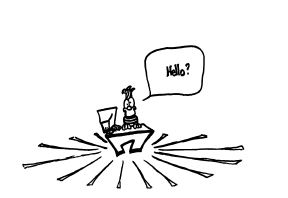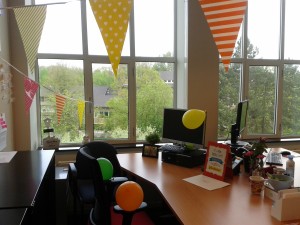 Sometimes, when two people in a relationship each have their own house, their own businesses and value their independence, they could have a LAT-relationship: Living Apart Together. Sometimes, when a bunch of colleagues each have their own offices, their own projects and value their own intellectual paths, they could have a WAT-relationship: Working Apart Together. A PhD can be considered quite an individual job.
Sometimes, when two people in a relationship each have their own house, their own businesses and value their independence, they could have a LAT-relationship: Living Apart Together. Sometimes, when a bunch of colleagues each have their own offices, their own projects and value their own intellectual paths, they could have a WAT-relationship: Working Apart Together. A PhD can be considered quite an individual job.
You are working on your own project, within your own small field of expertise. So are the other PhD’s. It might seem like we are all floating on little islands, within the vast educational-research-ocean, and never bump into each other. However, luckily, the opposite is true.
We bump into each other daily in the corridor and in our (shared) offices, and fortunately we do not float at sea for I am sure some of us would end up seasick. Your colleagues can help you a great deal with your project, even if they are not working on the same thing. If you have a good relationship with your colleagues, they can give you both intellectual and emotional support in your work. You may be Working on your projects Apart, but you are all in this job Together! So why not help each other along the way? A good WAT-relationship occurs frequently here at ICLON, and here are some field-examples of PhD’s working here:
Tessa:
My colleagues gave me such a warm welcome when I started working here. They immediately made me feel lik e I was part of the group. They stop by every now and then, and give me very useful tips on reading for example. Whenever I feel overwhelmed by my research, one of my colleagues will always notice and help me to put things into perspective. And, last but not least, both at the ICLON and TU Delft (I am a shared PhD) my colleagues surprised me for my birthday by decorating my room and chair
e I was part of the group. They stop by every now and then, and give me very useful tips on reading for example. Whenever I feel overwhelmed by my research, one of my colleagues will always notice and help me to put things into perspective. And, last but not least, both at the ICLON and TU Delft (I am a shared PhD) my colleagues surprised me for my birthday by decorating my room and chair
Saskia:
I too, was welcomed warmly into the ICLON-nest. However, that is not what I want to talk about. I would like to share my story of how long it sometimes takes me to either get to the kitchen (on one hand of the corridor) or to the toilet (on the other end of the corridor)… I know many times it is my own doing, but the idea is that I quickly step into an office, make a remark and then continue my way down the corridor. However, it is not rare that ‘just popping in’ becomes a long conversation. My colleagues and I are often in for a nice talk to keep the spirits up J That’s why I try not to work too often from my own home: I literally start missing my colleagues!
Tran:
I was also cordially welcomed by Iclon members and I felt really warm when I saw a lovely jar of flowers on my table. One of the most interesting things that I have found from my Dutch colleagues and also other international friends is that you are very elaborate people. Whenever I needed help, everything was carefully explained and instructed. In Vietnamese culture, when you ask for help, people usually show you something very general and then if you need more help, they will continue tell you how to do things. However, I recognized that my colleagues in ICLON, from the beginning, tried to make things in details and I always appreciate your time for helping me. Another fun thing here is lunch time. I have to say that I rarely missed lunch time (perhaps, I am a lazy student and always join lunch time to relax). Nevertheless, in my mind, lunch time is a great time to meet and get acquainted to people. There were days that I ate lunch alone and wished all of you came back from holiday to join me. I think when I graduate, my Ph.d life will be the most memorable time in my life, missing all of my friendly companions in ICLON.
Indira:
What I want to talk about is not the loads of fun we have together. Although I must say that working here is very “gezellig”, as we Dutch people say.
My working apart together-relationship with my fellow PhD students is enriched by the huge amount of knowledge we share between all of us. There is always someone who knows the answer to your question. Or at least they can point you to a reference that helps. When you’re blind to the solution because you’ve been working on something far too long, your roommates can be unbiased reviewers and try to help you out. And when you have a problem so large that none of your fellow PhD students can help you out, at least they know how it feels to be stuck on something and they will commiserate with you. Because even if we’re working on our own, somehow we’re all in this together.
How do you define your and your colleagues’ WAT-relationship? Please let us know in the comments below!







